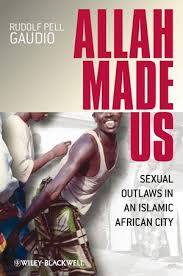 Allah Made Us: Sexual Outlaws in an Islamic African City
Allah Made Us: Sexual Outlaws in an Islamic African City
by Rudolf Pell Gaudio
Wiley-Blackwell. 256 pages, $29.95
IN 2002, a film company based in the northern Nigerian city of Kano released the comedy Ibro Dan Daudu. Featuring popular actors from that West African country portraying men behaving in “womanlike” ways, swinging their hips as they walked, speaking in high-pitched voices, and referring to each other as “she,” “mother,” or “girl,” the film exaggerated popular stereotypes of men who transgress gender roles in Nigeria, and reinforced notions that such men were unscrupulous and “shameless” hedonists in contrast to their pious and more ethical neighbors. While many found the film, as one reviewer put it, “just clean fun,” and it became a commercial success, the men who lived the reality hidden behind the swishy stereotypes found the movie both inaccurate and insulting.
In Allah Made Us: Sexual Outlaws in an Islamic African City, Rudolf Pell Gaudio brings readers into the culture that film obscured. Based on the author’s extended stays in Islamic northern Nigeria from 1993 to 1995, and again in 2003, Gaudio introduces a community at once familiar to, yet different from, Western experiences of gender presentation and sexuality. Many of the men called ’yan daudu “act like women” by virtue of doing women’s work, such as cooking and serving food, as well as “playing with” other feminine social practices through songs, dances, gestures, clothing, and language. In keeping with the norms of their Hausa culture, however, most ’yan daudu marry women and have children. Despite being subjected to harassment, ostracism, and abuse at the hands of police and criminals alike, the Muslim ’yan daudu believe, as the book’s title suggests, that their personality traits and attraction to other men are attributes bestowed by God.
After opening chapters introducing readers to the ’yan daudu and how representations of them have changed throughout the course of Nigerian history, Allah Made Us presents the stories of individual men and their relationships to explore how they use language and in-group code (the “harka dialect”) to speak about sex and their experiences with each other while keeping it hidden from those not part of their world. One of the book’s more fascinating chapters explores the role Islam plays in the lives of these men. A surprising number of ’yan daudu make frequent pilgrimages to Mecca, which brings them a certain level of cultural respect when they return to home as “sophisticated actors on a transnational Islamic stage without ever shedding the stigma associated with what is seen as their culturally and religiously deviant behavior.”
It will be difficult for American readers of Allah Made Us not to make comparisons with gay life in general and African-American gay life in particular. While many ’yan daudu are “known,” others are considered “shirted,” maintaining an ordinarily masculine identity in public, similar to what we might call “straight-acting” or even “closeted.” Their relationships with “men seeking men” may bring up thoughts of Americans on “the Down Low.” The friendships and nurturing relationships between older and younger ’yan daudu is reminiscent of African-American “Ball culture” with its constructed families and “House Mothers.” Gaudio’s examination of how ’yan daudu use “women’s talk” and masculine and feminine words and pronouns when referring to each other, along with their culturally acknowledged verbal skills and sharp wit, may also remind many of drag queens and the cutting mots of Oscar Wilde. Gays everywhere will undoubtedly be familiar with a character like one ’yan daudu who seems to have a knack for stealing his girlfriends’ boyfriends wherever he goes.
Rudolf P. Gaudio, an associate professor of anthropology at SUNY–Purchase, also does important work by showing how attacks on ’yan daudu and others who transgress social norms are often used by Nigerian and other African politicians for political ends, as a way to attack globalization and other “Western influences.” By imposing our notions of gay and straight on men like the ’yan daudu, Gaudio warns that we may be ignoring more complex indigenous expressions of same-sex desire and even driving them further underground.
The world of the ’yan daudu that Gaudio first met in the mid-1990’s had been shattered a decade later, first by the hiv/aids crisis and later by the introduction of Islamic Law (Shari’a) in portions of northern Nigeria in 2000. Their “play” with language and gender roles was less frequent and less obvious but had not entirely disappeared. Both scholarly and enthralling, Allah Made Us succeeds in introducing us to a fascinating world usually hidden from Western view, as well as making a strong case for how sexual and gender expression—and its transgression—is deeply embedded in individual cultures.
Reginald Harris is a contributor to the Encyclopedia of Contemporary LGBTQ Literature of the United States (Greenwood Press 2009).






